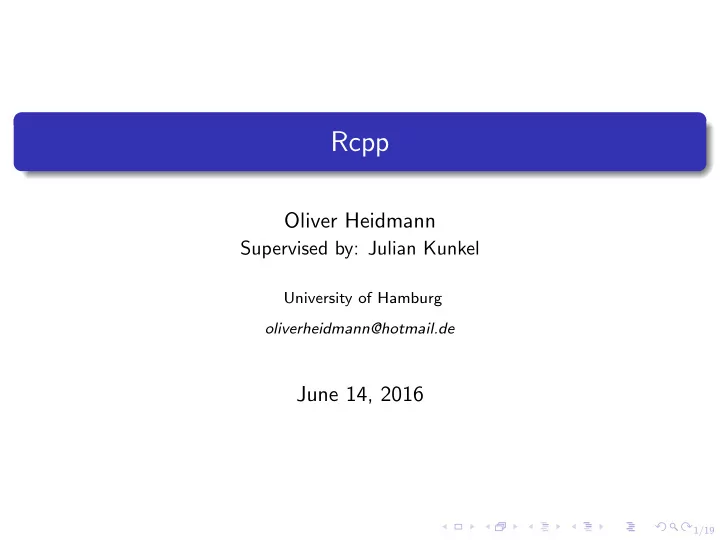

Rcpp Oliver Heidmann Supervised by: Julian Kunkel University of Hamburg oliverheidmann@hotmail.de June 14, 2016 1/19
Overview What is C++? 1 What is Rccp? 2 Rcpp basics 3 RObject and SEXP Rcpp basics: Type Mappings conversion methods Calling a function Writing R code 4 Rcpp.package.skeleton Example parts 5 cpp Export function c++ function calling the function package inline sourceCpp RuntimeComparison Conclusion 6 sources 7 2/19
What is C++? ◮ object orientated programming languge ◮ intermediate level language ◮ high level language features and also ◮ low level language features ◮ designed to be ◮ fast at executing ◮ efficient with memory ◮ flexible in the way it can be used 3/19
What is Rccp? ◮ easy integration of c++ code ◮ mappings from r objects to c classes ◮ package skeleton creation ◮ flexible error and exception handling 4/19
RObject and SEXP ◮ Rcpp::RObject is a very thin wrapper around an SEXP. ◮ Rcpp::RObject defines set of functions applicable to any r object ◮ SEXP only member of Rcpp::RObject. ◮ SEXP represents r object ◮ SEXP is guarded from Garbage collection through Rcpp::RObject 5/19
Rcpp basics: Type Mappings What is Wrappable? ◮ int double bool to R atomic vectors ◮ std::string to R atomic character vectors ◮ STL containers ◮ and any class that has a SEXP() operator for conversion ◮ or any class in which wrap() tamplate is specialized 6/19
conversion methods Rcpp::wrap for converting c++ types to R template <typename T> SEXP wrap(const T & object) Rcpp::as for converting R types to c++ types template <typename T> T as(SEXP x) 7/19
Calling a c++ function in r ◮ calling done with .call(...) ◮ r function call ◮ calls the c function for r .call( "function_name", parameter_1, ..., parameter_n, package="packagename" ) 8/19
Rcpp.package.skeleton ◮ r command to create skeleton rcpp package ◮ already in Rcpp package ◮ can be created with example functions ◮ very easy to get into 9/19
rcpp skeleton package guide rough guide in package included ◮ edit the help file skeletons in ’man’, possibly combining help files for multiple functions. ◮ edit the exports in ’NAMESPACE’, and add necessary imports. ◮ put any c/c++/fortran code in ’src’. ◮ R CMD build to build the package tarball. ◮ R CMD check to check the package tarball. 10/19
cpp Export function RcppExport SEXP test_add_lists(SEXP r_list1, SEXP r_list2) { std::vector<int> cpp_vector1; std::vector<int> cpp_vector2; BEGIN_RCPP Rcpp::RObject __result; Rcpp::RNGScope __rngScope; cpp_vector1 = Rcpp::as<std::vector<int>>(r_list1); cpp_vector2 = Rcpp::as<std::vector<int>>(r_list2); __result = add_lists(cpp_vector1, cpp_vector2); return Rcpp::wrap(__result); END_RCPP } 11/19
c++ function std::vector<int> add_lists(std::vector<int> vec1, std::vector<int> vec2) { std::vector<int> result; unsigned long max_length; max_length = std::min(vec1.size(), vec2.size()); for (unsigned long i = 0; i < max_length; i++) { result.push_back(vec1[i] + vec2[i]); } return result;} 12/19
calling the function add_lists <-function(vec1, vec2) { .Call( "test_add_lists", vec1, vec2, PACKAGE = ’test’) } 13/19
package inline add <- cppFunction(" double add(double x, double y) { double sum = x + y; return sum; } ") add(-0.01,1.02) output: 1.01 14/19
sourceCpp simple-c-functions.cpp #include <Rcpp.h> #include <iostream> // [[Rcpp::export]] double myCmean(Rcpp::NumericVector x) { double result = 0; for(auto v : x) { result += v; } return result/x.length(); } 15/19
sourceCpp main.R require(Rcpp) sourceCpp("simple-c-functions.cpp") myCmean(10.01,1.1,2.26) output: 13.37 16/19
Runtime comparison x = vector with 10000 entrys of type numeric/double each function was executed 1000 times unit: microseconds function min median max r inlineMean(x) 12.054 14.5440 49.531 r mean(x) 2062.821 2151.4090 3021.454 c mean(x) 9.179 9.8325 21.462 17/19
Conclusion ◮ Rcpp is easy to get into ◮ package creation is fast and easy ◮ sourceCpp() easiest way of using small cpp functions ◮ c++ code is a lot faster 18/19
sources ◮ http://dirk.eddelbuettel.com/code/rcpp/Rcpp-introduction.pdf 13.6.2016 ◮ http://dirk.eddelbuettel.com/code/rcpp/Rcpp-package.pdf 13.6.2016 ◮ http://dirk.eddelbuettel.com/code/rcpp/Rcpp-FAQ.pdf 13.6.2016 ◮ https:://www.techopedia.com/definition/26184/c-programming- language 13.6.2016 ◮ adv-r.had.co.nz/Rcpp.html 13.6.2016 ◮ https://cran.r- project.org/web/packages/microbenchmark/microbenchmark.pdf 13.6.2016 19/19
Recommend
More recommend